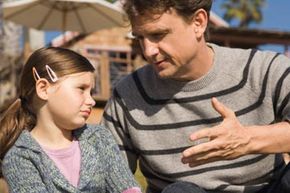 “Parents have a number of choices about how to raise their children. See more parenting pictures.Nick Daly/Getty Images
“Parents have a number of choices about how to raise their children. See more parenting pictures.Nick Daly/Getty Images
Every parent wants to raise healthy, happy children. But not everybody thinks about parenting in the same way. What we think and feel affects how we raise our children. But how do we come to think and feel the way we do about parenting and children?
A lot of your ideals about parenting most likely come from your own parents. They might fit one of the four prototypical parenting styles — authoritarian (extremely strict), authoritative (moderately strict), permissive or uninvolved [source: AboutOurKids.org]. Are you emulating the way they raised you, picking and choosing from their parenting tips, or consciously doing the opposite of what they did? Parents also take their cues from the culture, where they seek parenting tips through self-help books and parenting classes.
All of these sources provide tips about how to raise children at every step of their development. Those choices begin early, with decisions about how to teach an infant to sleep through the night and whether they’ll be alright in day care. You might decide to bring your baby to bed with you if he wakes up, or you might decide it’s okay to let him cry it out [source: BabyCenter.com].
As a child becomes more aware of choices and their consequences, discipline becomes an issue. Parenting preschoolers means a whole new set of decisions about boundaries, including time-outs, withholding privileges and showing children the consequences of their actions [source: HealthyChildren.org]. Preschool is also a time when different parenting psychologies call for different approaches to education. Language development, socialization and building reading skills are all developmental issues that parents decide how to handle based on their parenting model [source: Centers for Disease Control and Prevention].
As children become more independent, they take on more responsibilities, rewards and freedom. How many responsibilities and how much freedom they’re allowed to earn are affected by parenting psychology. A juvenile’s ability to complete assigned chores can be affected by how much structure is present in a family [source: HealthyChildren.org]. If they don’t complete them, discipline may be necessary. If they do complete them, there’s the question of how to reward children. Juveniles also test the limits of their independence. Children develop a sense of right and wrong, learn to follow rules or disobey them, and begin to choose their own path in life at this stage [source: Centers for Disease Control and Prevention].
Teenage years bring parents a virtually unlimited supply of decisions about parenting, including curfews, friends, and rules about dating, driving and future education options. All of these questions surround one main theme — preparing a child to live independently.
For lots more information on parenting, see the links on the next page.
Lots More Information
Related HowStuffWorks Articles
- How Parenting Communication Works
- How Health Co-parenting Works
- How Being a Single Parent Works
- 10 Tips for Parenting Preschoolers
- 10 Tips for Parenting Preteens
- 10 Tips for Parenting Teens
Sources
- AboutOurKids.org. "Parenting Styles/Children’s Temperments: The Match." 2010. (March 5, 2010) http://www.aboutourkids.org/articles/parenting_styleschildren039s_temperaments_match
- AboutOurKids.org. "Raising Responsive and Responsible Children." 2010. (March 5, 2010)http://www.aboutourkids.org/articles/raising_responsive_responsible_children
- KidsHealth.org. "Nine Steps to More Effective Parenting." 2010. (March 5, 2010)http://kidshealth.org/parent/positive/family/nine_steps.html
- Parenting.org. "Common Sense Parenting." 2010. (March 5, 2010)http://www.parenting.org/common-sense-parenting
- BabyCenter.com. "Big Story: New sleep-training guidance for tired parents." March 2007. (March 5, 2010)http://www.babycenter.com/0_big-story-new-sleep-training-guidance-for-tired-parents_1524201.bc
- American Academy of Pediatrics. "Parenting Corner Q&A: Working Mothers." June, 2007. (March 5, 2010)http://www.aap.org/publiced/BK0_WorkingMothers.htm
- HealthyChildren.org. "Disciplining Your Child." Dec. 3, 2009. (March 5, 2010)http://www.healthychildren.org/English/family-life/family-dynamics/communication-discipline/pages/Disciplining-Your-Child.aspx
- Centers for Disease Control and Prevention. "Child Development: Preschoolers (3-5 years old)." Sept. 20, 2005. (March 5, 2010)http://cdc.gov/ncbddd/child/preschoolers.htm
- HealthyChildren.org. "Chores and Responsibility." March 5, 2010. (March 5, 2010)http://www.healthychildren.org/English/family-life/family-dynamics/communication-discipline/pages/Chores-and-Responsibility.aspx
- Centers for Disease Control and Prevention. "Child Development: Middle Childhood (9-11 years old). Sept. 20, 2005. (March 5, 2010)http://cdc.gov/ncbddd/child/middlechildhood9-11.htm
- Parenting.org. "Taking Flight." 2010. (March 5, 2010). http://www.parenting.org/taking-flight
- HealthyChildren.org. "Fair and Reasonable Limits for Teens." March 5, 2010. (March 5, 2010)http://www.healthychildren.org/English/family-life/family-dynamics/communication-discipline/pages/Fair-and-Reasonable-Limits-for-Teens.aspx







































